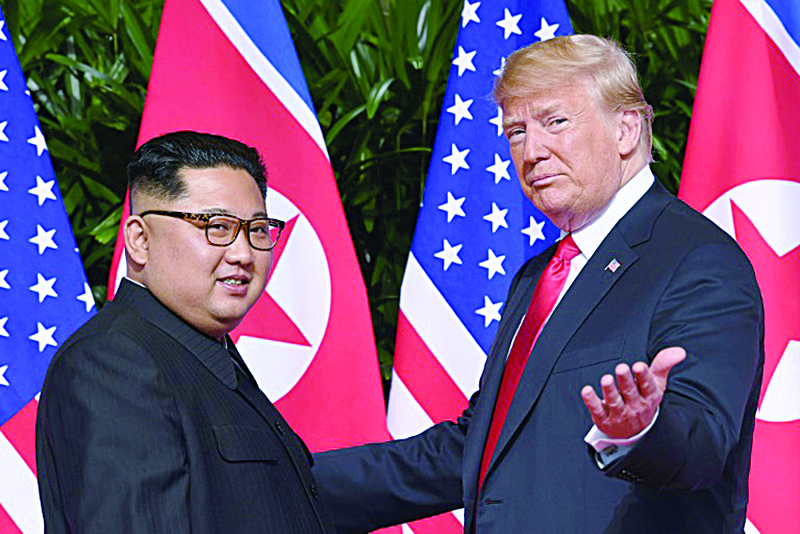
SEOUL: Headline-grabbing summits between the leaders of North Korea and the United States will be off the agenda for some time, analysts say, after US president-elect Joe Biden characterized Kim Jong Un a "thug", in contrast to Donald Trump's declarations of love. Trump's bizarre diplomatic engagement with Pyongyang veered from mutual insults and threats of war to "love letters" and the first ever meeting between a sitting US president and a North Korean leader.
The two mercurial men met twice more after their landmark summit in Singapore in 2018, but with no concrete progress in denuclearization efforts. Now Biden's victory heralds a return to more standard diplomatic norms, analysts say, with his administration wanting to see tangible steps towards denuclearization and progress at a series of working-level negotiations before any made-for-TV summits.
On the campaign trail, Biden said he would not meet with Kim without preconditions and accused Trump of "emboldening" the North Korean leader. In the final presidential debate last month, the Democrat denounced Trump for befriending Kim, likening the North Korean leader to Adolf Hitler. "He's talked about his good buddy, who's a thug," Biden said of Kim. "That's like saying we had a good relationship with Hitler before he invaded Europe." For its part, while Pyongyang's state media has yet to mention the election or the result, it has previously excoriated Biden, with the official Korean Central News Agency calling him a "rabid dog" that must be "beaten to death".
'Slightly peeved'
According to analysts North Korea saw in Trump's unorthodox approach its best chance of securing a deal that would allow it to keep at least some of its nuclear weapons and intercontinental ballistic missiles (ICBMs), both of which are banned under UN Security Council resolutions. Pyongyang will be "slightly peeved by the change in leadership", said former CIA analyst Soo Kim. "The regime is aware the prospects of a top-level meeting with a US leader are going to be slim now," she added.
"We're expecting a more principled, systematic approach to Pyongyang. This likely means less ad hoc interactions and some method to dealing with Kim."
Throughout the process with Trump, Pyongyang has continued to develop and advance its arsenal, displaying an array of new weapons-including a huge new ICBM-at a military parade last month marking the 75th anniversary of its ruling party. It has carried out dozens of missile launches since the collapse of the second Kim-Trump summit in Hanoi in February 2019, but the North has made sure not to cross the US president's red lines of an ICBM or nuclear test.
Pyongyang probably held off testing strategic weapons this year "out of consideration for Trump", said Shin Beom-chul, a researcher at the Korea Research Institute for National Strategy. "North Korea hoped for Trump's re-election," he said. But Pyongyang has become increasingly frustrated that the vaunted personal relationship between Kim and Trump has not led to an easing of sanctions or other substantive concessions from Washington. In July, Kim's powerful younger sister said the US appeared to be "hostile" towards the North "no matter how good the relations between the top leaders".
'Adverse reaction'
Biden's victory will have "greatly complicated Pyongyang's calculations", said Park Won-gon, a professor of international relations at Handong Global University. North Korea despises Biden for his role in the Obama administration, which adopted a policy of "strategic patience", refusing to engage with Pyongyang unless it offered concessions first, or until the regime collapsed from within.
The North carried out a nuclear test four months into Obama's first term, but is likely to wait to assess the Biden administration's approach before launching major provocations in a bid to seize the "upper hand", said former CIA analyst Kim. "Kim Jong Un may understand that a poorly timed launch may elicit an adverse reaction from the US and its partners," she said.
Instead, Park suggested, Pyongyang may resort to lower-level actions to try to grab the new US president's attention. "There is a large possibility that Pyongyang will target South Korea," he said. "It could judge that it is safer to create tension on the Korean peninsula." -AFP
.jpg)
